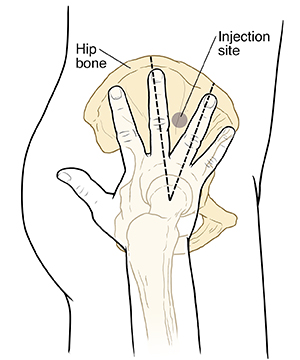Discharge Instructions: Giving an Intramuscular (IM) Injection in the Hip
Your health care provider has prescribed a medicine that must be given by intramuscular (IM) injection. IM injections use a needle and syringe to send medicine to large muscles in your body. They are usually given in the thigh, hip, or upper arm.
You were shown how to do an IM injection in the hospital. If you did not get an instruction sheet covering those general steps, ask for one. This sheet reminds you or your caregiver how to give an IM injection in the hip. Another person must help you with this injection.
Name of your medicine: _______________________________.
Amount per injection: _________________________________.
Times per day: ______________________________________.
Number of days: ______________________________________
Step 1. Getting ready
-
Gather your supplies.
-
Wash your hands well with soap and clean water or alcohol-based hand sanitizer. The person who is helping you must also wash their hands well.
-
Prepare your medicine as you were shown by your health care provider.
Step 2. Finding an injection site
The person who is helping you can find an injection site on your hip by doing the following:
-
The other person will find the place where your thighbone meets your hip. This is a bony, ball-like area. The other person will place the palm of their hand over this bony area.
-
The other person’s fingers should point toward the ceiling if you are standing, or towards your head if you are lying on your side. Then they will make a V with the ring finger and middle finger.
-
The bottom point of the V is where the other person’s ring finger and middle finger meet.
-
The injection site will be between the knuckles on the other person’s ring finger and middle finger. This is where the needle will be inserted.
-
The other person will prepare the injection site as you were shown by your health care provider. (See the general instruction sheet on giving yourself an IM injection. If you did not get this sheet, ask for one.)

Step 3. Injecting the medicine
-
The other person will stretch your skin tight. If your health care provider recommends the Z-track method, the other person will pull your skin gently to the side.
-
The other person will hold the syringe like a pencil. Then they will insert the needle straight into your skin.
-
You may be told by your provider to have the person giving you the injection pull back slightly on the plunger. This is to make sure they did not hit a blood vessel with the needle. If blood appears in the syringe, remove the needle and don't inject the medicine. It might go into the bloodstream and not the muscle. Dispose of the needle and syringe in a sharps container and repeat the process in a different spot on your hip (or on the other hip).
-
To inject the medicine, the other person will push down on the plunger at a steady rate.
-
You should have no more than 5 milliliters (mL) of medicine in this site. If the prescribed dose is more than 5 mL, choose a different site to inject the rest of the medicine.
Step 4. Removing the needle
-
The other person will remove the needle and syringe outward, away from your body.
-
They will let go of your skin.
Step 5. After the injection
-
You or the other person can press a gauze pad onto the site.
-
Hold the pad tightly for a minute.
-
Check the area for redness, bleeding, or bruising.
-
Apply a bandage to the site, if needed.
-
The other person will put the needle and syringe in a special container (sharps container).
-
Dispose of the other materials as you were shown by your health care provider.
-
Wash your hands well. The person who is helping you must also wash their hands well.
Medicine that comes in a container for a single dose should be used only 1 time . If you use it a second time, it may have germs that can cause infections. These infections usually affect the skin and soft tissues. But some infections can affect the brain, spinal cord, or heart. Sharing another person's used needles or medicines can cause other infections, such as hepatitis B and hepatitis C.
Follow-up care
Follow up with your health care provider as advised.
When to call your health care provider
Contact your health care provider right away if you have any of the following:
-
Needle that breaks off at the injection site
-
Problems that keep you from getting the injection
-
Bleeding or bad pain at the injection site that won’t stop
-
Medicine injected into the wrong area
-
Rash or swelling at the injection site
-
Shortness of breath
-
Fever above 100.4°F ( 38°C ), or as directed by your health care provider
Online Medical Reviewer:
Amy Finke RN BSN
Online Medical Reviewer:
Jessica Gotwals RN BSN MPH
Online Medical Reviewer:
Robert Hurd MD
Date Last Reviewed:
1/1/2025
© 2000-2025 The StayWell Company, LLC. All rights reserved. This information is not intended as a substitute for professional medical care. Always follow your healthcare professional's instructions.